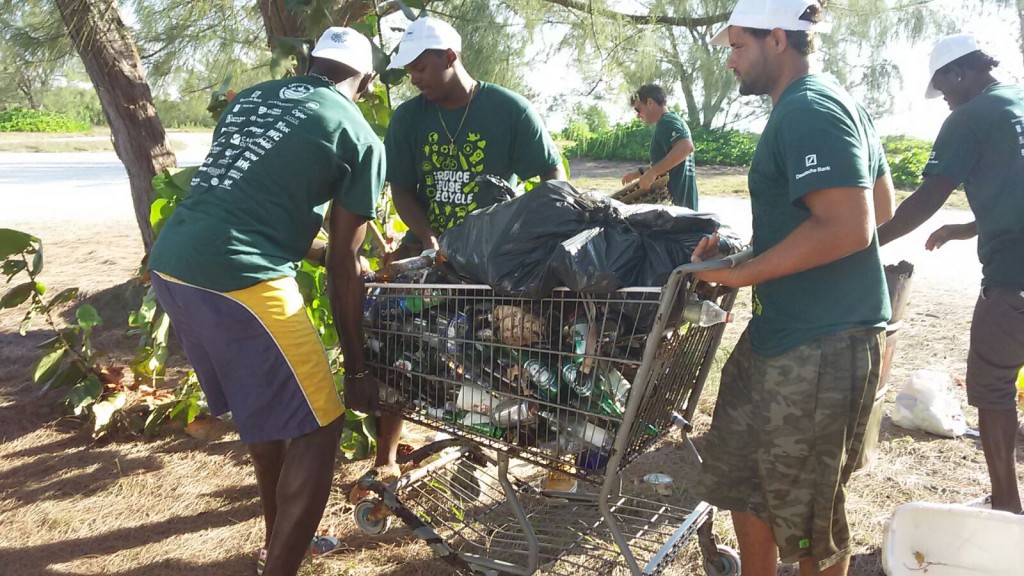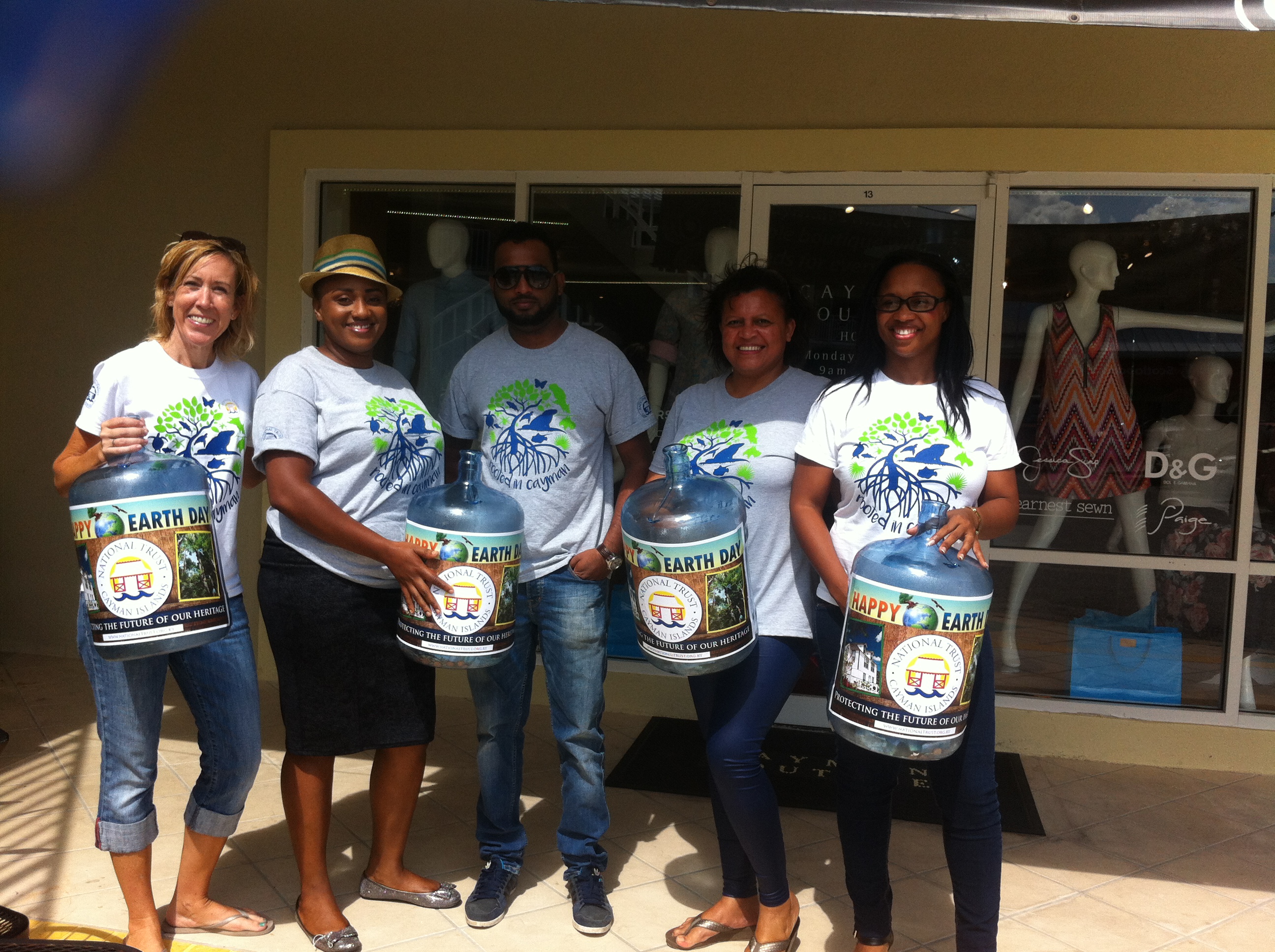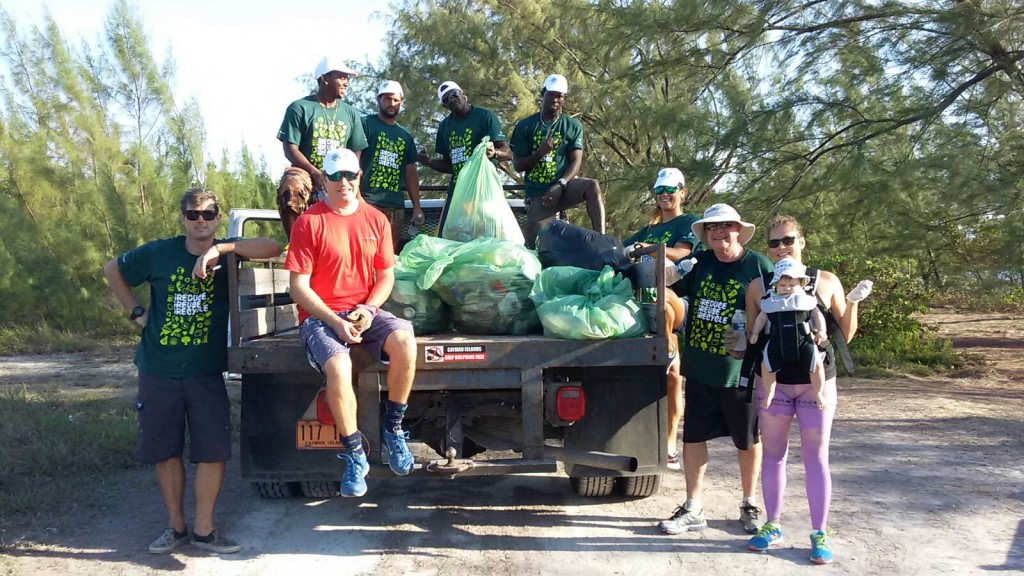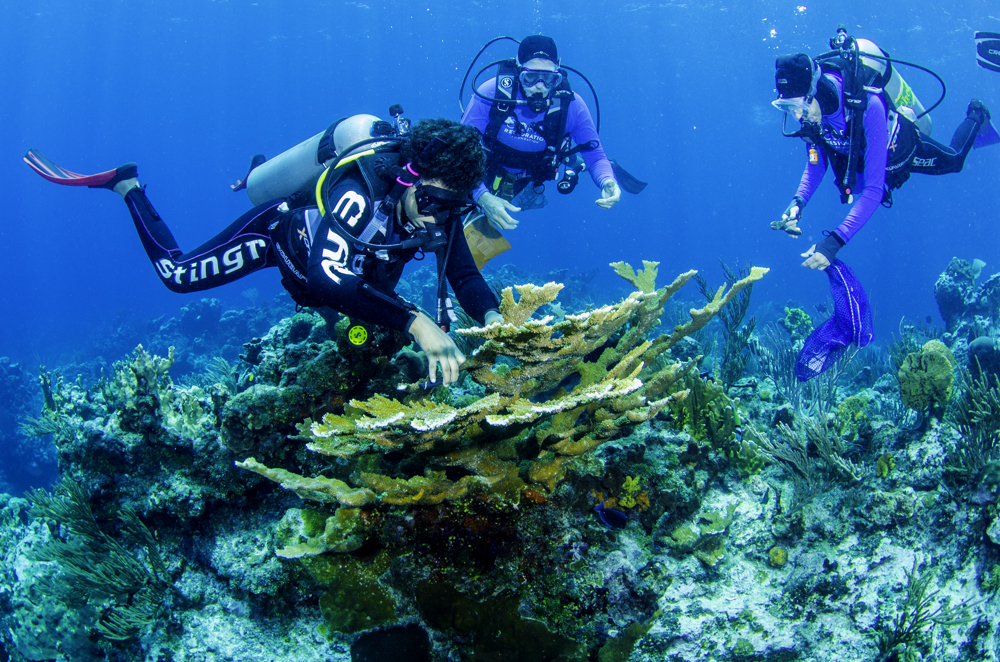Marine Life & Conservation
Earth Day Activities in the Cayman Islands Focus on Conservation
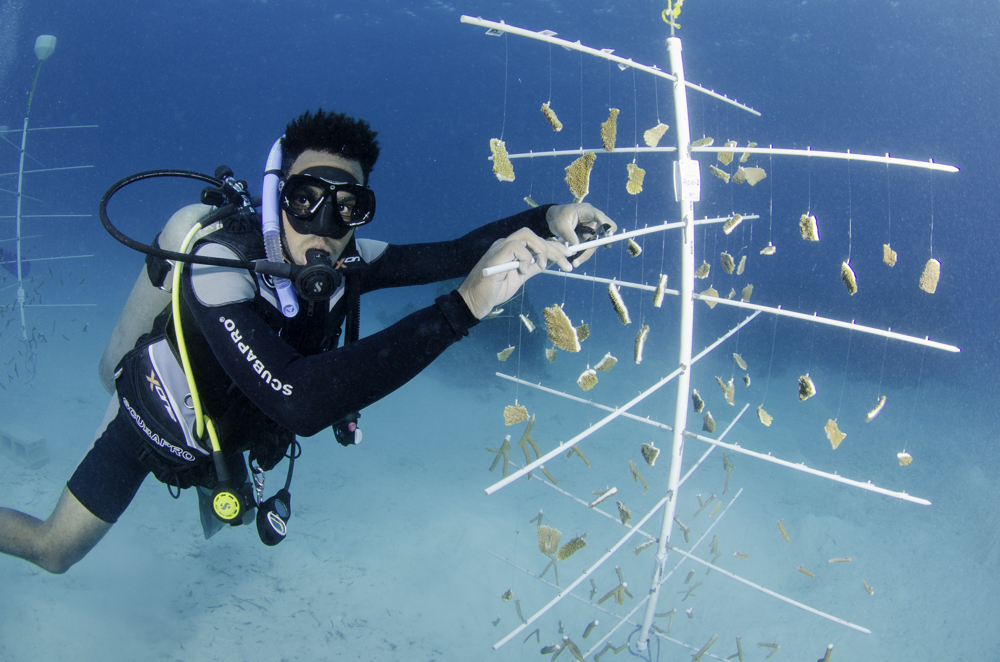
Dive Industry leaders say it is a 365-day commitment to keep Cayman’s environment a major tourist attraction that draws visitors from around the world
The beaches, roads and reefs of the Cayman Islands have been tidied up just in time for the summer tourism season thanks to hundreds of volunteers who helped with the annual Earth Day cleanup on the 16th April. Eager to help, Red Sail Sports employees, accompanied by Operations Manager Rod McDowall, rose early that day to pick up trash in the Safehaven area where the company docks its Catamarans and dive boats. After they collected bags of trash, the volunteers put in a full day of work at the beach or on the catamarans.
“Everybody had laugh, especially at some of the items we found,” said Gary Chernowski, one of the company’s watersports managers. “We found all sorts of stuff from fast food wrappers, beer and soda cans/bottles to car parts and rusty old shopping trolleys.”
Hundreds of volunteers collected tons of trash across the island that day. Earth Day is recognized across the world as the day to focus on protecting the environment; something Cayman’s dive operators do all year round. In honor of Earth Day celebrations, Divetech offered free tanks and weights for divers willing to help clean up near shore reefs. Divetech also offered a free dive trip to divers willing to participate in a fish count at the Kittiwake Wreck for on-going conservation studies. Red Sail Sports offered a free dive trip for volunteer divers who participated in a Lionfish cull.
“The local dive industry operates regular Lionfish culls every month to try and keep the Lionfish population down. This is something we are committed to as a community because it affects the whole dive tourism industry of the Cayman Islands,” said Red Sail Sports Operations Manager Rod McDowall. “We are all in this together and we fight together to protect our reefs.”
In honor of Earth Day, Ocean Frontiers also announced the installation of Grand Cayman’s biggest coral nursery in the East End of the island near the dive shop.
“We are thrilled because our coral nursery has been in the planning process for more than a year and to announce this during Earth Day celebrations makes the occasion even more memorable,” said co-owner Steve Broadbelt. “The goal of our coral nursery is to grow coral fragments of the endangered Staghorn and Elkhorn corals and then out-plant the corals to designated reefs that have shown signs of coral loss or damage.”
The Cayman Islands Department of Environment is working with Ocean Frontiers and other local operators in coral garden projects. Divetech and Red Sail Sports also participate in educational programs year round to teach island schoolchildren about conservation. The Southern Cross Club in Little Cayman is a long-time partner in an important research program to protect the endangered Nassau Grouper. All the dive operators heavily promote conservation in pre-dive briefings and encourage guests to be careful while observing reefs and the creatures that live there. Trash is also a problem; discarded bottles, cans, fishing line, weights and other garbage end up on fragile reefs, causing problems for the marine life.
“We’ve seen octopus and other sea life actually make their homes in discarded bottles and cans, and that’s something to keep in mind when we do reef cleanups,” said Keith Sahm, Sunset House General Manager and Co-Founder of SaveCayman.org. “Let’s let them find an appropriate natural habitat to hide and not in an empty beer bottle carelessly tossed overboard. Earth Day needs to be on everyone’s mind 365 days a year and you can help by simply picking up after yourself.”
With an eye to a sustainable future, Sahm attended Earth Day Texas, the world’s largest annual forum for sharing conservation initiatives, discoveries, research, innovations, policies, products, and more. He says everyone can play a big role in creating awareness and action to protect the environment, and it is up to us to work together to build a more sustainable future.
Everyone agrees keeping Cayman’s natural environment clean and healthy is good for tourism. The cleanup was done just before one of Grand Cayman’s most popular summer dive attractions – the annual migration of millions of silversides that fill island’s near shore reefs during June, July and August. Dive sites like Devil’s Grotto, Eden Rock and now even the Kittiwake Wreck become sites of Cayman’s famed “Silver Rush” – tarpon feasting on the swarms of tiny silver fish.
Going ‘Back to Nature’ for Earth Day is also a good reminder for everyone that turtle nesting season is approaching. Trash-free beaches enable turtles to find good nesting sites and increase the chances of hatchlings surviving.
Another 11 Red Sail Sports volunteers participated in the ‘Shake Your Tin For Nature’ campaign to help raise awareness and collect money for the National Trust of the Cayman Islands environmental and education programs. They were among 300 volunteers placed in high-traffic areas with banners and signs to remind commuters of the importance of Earth Day.
Marine Life & Conservation
Paul Watson Released as Denmark Blocks Japan’s Extradition Bid

Renowned anti-whaling activist Paul Watson has been released from custody in Greenland after spending five months in detention. Denmark’s Justice Ministry rejected Japan’s request for his extradition, citing insufficient guarantees that his time already served in custody would be credited against any potential sentence.
The 74-year-old Canadian-American was arrested on July 21 in Nuuk, Greenland’s capital, when his ship docked to refuel. His arrest was based on a 2012 Japanese warrant related to a 2010 encounter in Antarctic waters. Japan alleged Watson obstructed operations and caused damage to a whaling research ship during efforts to disrupt illegal whaling. Watson has consistently denied these claims, maintaining his commitment to marine conservation.
Denmark, which oversees extradition matters for Greenland, concluded that while the legal conditions for extradition were met, the lack of assurances from Japan regarding time-served credit made extradition untenable.
In a video shared by his foundation, Watson expressed gratitude and relief, saying, “After five months, it’s good to be out… and good to know they’re not sending me to Japan.” He added that the most difficult part of his time in custody was being separated from his two young sons.
Watson is a pioneering figure in marine conservation, known for founding the Captain Paul Watson Foundation in 2022 after decades of activism with the Sea Shepherd Conservation Society. His bold efforts to defend marine life have earned him widespread support, including from celebrities and conservationists. His work has also been featured in the acclaimed reality TV series Whale Wars.
Watson’s lawyer, Jonas Christoffersen, praised the decision, stating, “We are happy and relieved that Paul Watson is now free.” He added that Watson is eager to reunite with his family and continue his vital work.
The arrest occurred while Watson’s vessel, the M/Y John Paul DeJoria, was en route to the North Pacific with a team of 26 volunteers to intercept a Japanese whaling ship. His foundation described the arrest as politically motivated and emphasized that Watson’s actions were focused on ending illegal whaling practices.
Japan resumed commercial whaling in 2019 after leaving the International Whaling Commission, asserting that whale meat is a cultural tradition. Conservationists, however, continue to challenge these practices, highlighting their impact on marine ecosystems.
Despite the challenges, Watson remains steadfast in his mission to protect marine life and bring attention to whaling practices. His dedication to ocean conservation has made him a globally respected advocate for the environment.
Marine Life & Conservation
12 Days of Zero-Waste Fish-mas

This holiday period, the Marine Conservation Society, the UK’s leading ocean membership charity, invites you to make some simple changes to eating fish this Christmas to help our seas.
Dr Kenneth Bodles, Head of Fisheries and Aquaculture at the Marine Conservation Society, said, “During the festive season, our consumption increases, but so does waste. Sustainability isn’t just about where food comes from – it’s also about how you use it. By reducing waste and making the most out of your seafood, you’re not only taking steps to be more ocean-friendly, but can also help to cut costs during what is often one of the most expensive times of the year”.
The Marine Conservation Society has compiled twelve tips on how to consume seafood sustainably with zero-waste this Christmas:
Buy whole fish instead of fillets
Instead of fillets, consider buying whole fish such as salmon, hake, or lemon sole. By adopting a “nose to tail” approach with cooking, whole-baked fish not only feeds a crowd, but also helps to minimise waste and maximise sustainability by using up every part of the animal, including bones, skin, and fat.
Make fish stock
Leftover fish bones or shells can be put to good use by boiling them to make a nourishing fish stock or bisque. This can be frozen and preserved for later use and makes for a flavourful base in a soup.
Make your own fish pâté
Avoid waste by turning leftover fish, such as smoked mackerel or salmon, into a delicious pâté by blending with cream cheese and lemon. Perfect when paired with crackers.
The sustainability of salmon and mackerel varies depending on where and how it is caught or farmed. For more information on green-rated options, check the charity’s Good Fish Guide.
Buy frozen
By purchasing seafood that is frozen or vacuum-packed, this helps to reduce waste by extending the shelf life of your food.
Fish pie
If you’re wondering what to do with leftover cooked fish, why not opt for a classic fish pie with mashed potatoes, leeks, and a cheesy sauce? A sure crowd pleaser on Boxing Day.
Use the head
Don’t forget the fish head! The meat is incredibly tender and flavourful. The charity recommends a cod’s head curry or recreating Fallow’s renowned cod’s head in siracha butter.
By stretching your ingredients further, not only is this a more sustainable way to enjoy seafood, but also cost-effective by repurposing leftovers and cooking creatively.
Boxing Day brunch
Mix leftover kippers or smoked salmon with scrambled eggs for a tasty, zero-waste, Boxing Day brunch.
For best choice, make sure you buy kippers, or herring, from the North Sea and the North Irish Sea.
Zero-waste storage
A top tip from the Marine Conservation Society to avoid waste is freezing fish offcuts to save for future use.
Crisp up the skin
Even leftover fish skin can be turned into a quick savoury snack by crisping it up in an air fryer with a little olive oil and salt.
Anchovies two ways
Leftover anchovies can either be blended with butter to make a delicious anchovy butter or tossed into pasta for a hit of umami flavour.
The charity recommends opting for anchovies caught in the Bay of Biscay for best choice.
Fishcakes
For an easy, zero-waste meal, leftover seafood trimmings can be mixed with mash and fried in breadcrumbs to make fishcakes.
Pickled mussels
Try pickling mussels in 1:1 vinegar and water, with a dash of sugar for a sustainable, zero-waste snack that can be enjoyed well beyond the festive season.
Mussels farmed in the UK are a seafood superhero. Grown using low-impact methods and harvested by hand, they get all the food they need from the sea around them. This makes them one of the most sustainable, ocean-friendly, and cost-effective seafood options.
Players of People’s Postcode Lottery have raised £6.6M towards the Marine Conservation Society’s vital work in making seafood more sustainable.
Laura Chow, Head of Charities at People’s Postcode Lottery, said: “Fish is a festive favourite for many, but making sustainable choices when it comes to how we buy and eat seafood makes all the difference for our ocean. Support from players of People’s Postcode Lottery has helped the Marine Conservation Society further its sustainable seafood work, so that we can all enjoy healthier, better protected seas.”
The Marine Conservation Society encourages you to make sustainable seafood choices a year-round habit, not just for Christmas. To check how sustainable the seafood on your plate is, you can visit the charity’s Good Fish Guide. The Guide helps consumers and businesses identify the most sustainable seafood using a simple traffic light system, based on where and how species are caught or farmed. Green is the best choice, amber means improvements are needed, and red indicates fish to avoid buying.
Zero-waste gift idea
Why not embrace a zero-waste Christmas by gifting a membership to support marine conservation? It’s a meaningful, low-waste gift that helps protect our ocean for generations to come. Memberships start from as little as £5 a month – the price of a sandwich and drink from your local coffee shop.
Find the latest sustainable seafood advice for wild-caught and farmed seafood on the Good Fish Guide, downloadable to your phone from www.mcsuk.org/goodfishguide.
-

 News2 months ago
News2 months agoIconic SS United States to become the World’s Largest Artificial Reef
-

 News3 months ago
News3 months agoBook Review – 52 Assignments: Underwater Photography
-

 Gear News3 months ago
Gear News3 months agoDYNAMICNORD – New German diving brand enters the British market
-

 News3 months ago
News3 months agoExploring Cenote El Pit: A Diver’s Dream
-

 Gear News3 months ago
Gear News3 months agoTry BARE drysuits (and maybe even win one!) this Friday with Sea & Sea at North West Dive Fest
-

 Marine Life & Conservation3 months ago
Marine Life & Conservation3 months agoBook Review: Coral Triangle Cameos
-

 Blogs2 months ago
Blogs2 months agoDive the Egyptian Red Sea this Autumn with Regaldive
-

 News3 months ago
News3 months ago2024 Ocean Art Underwater Photo Competition Announced


